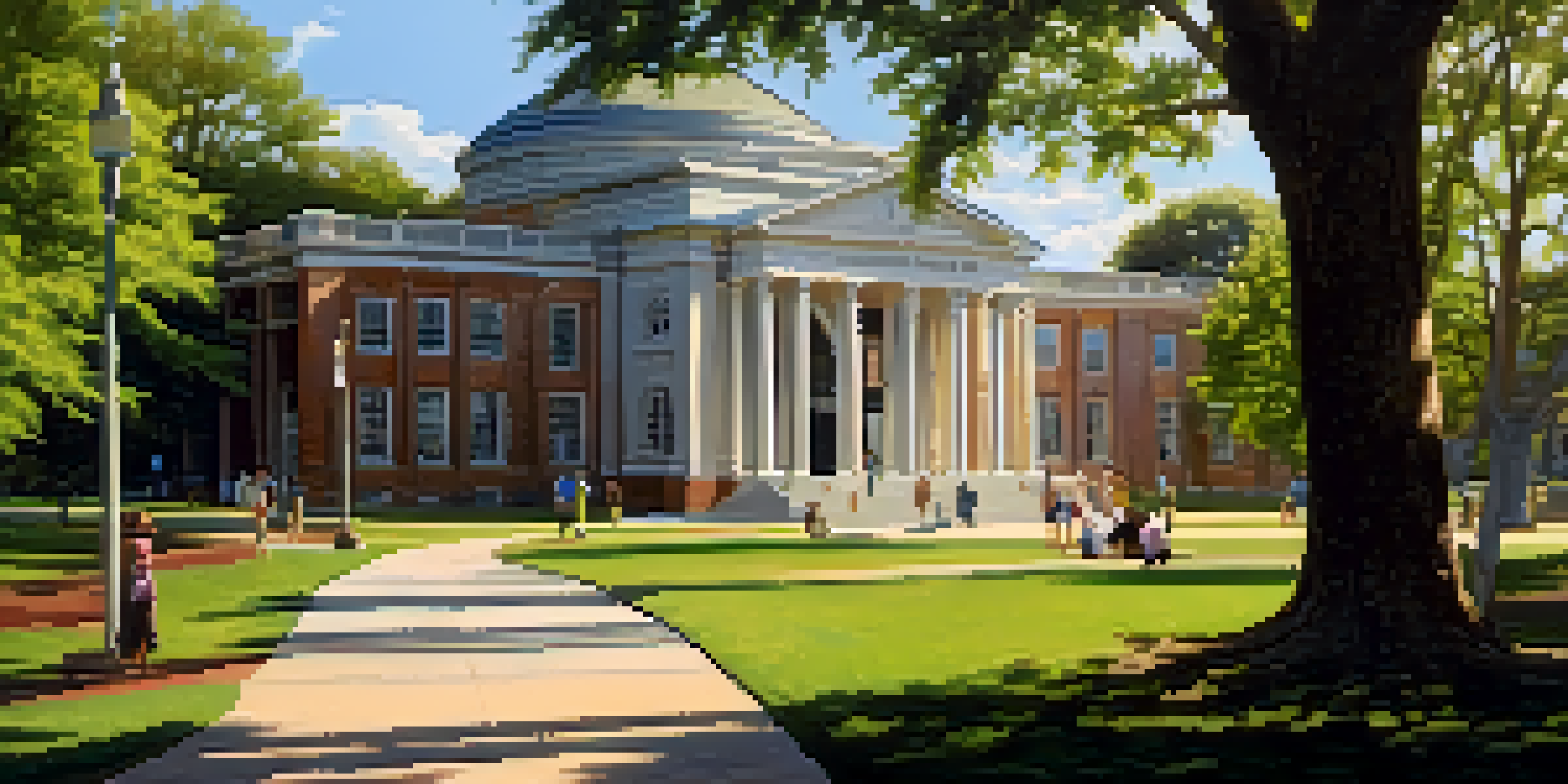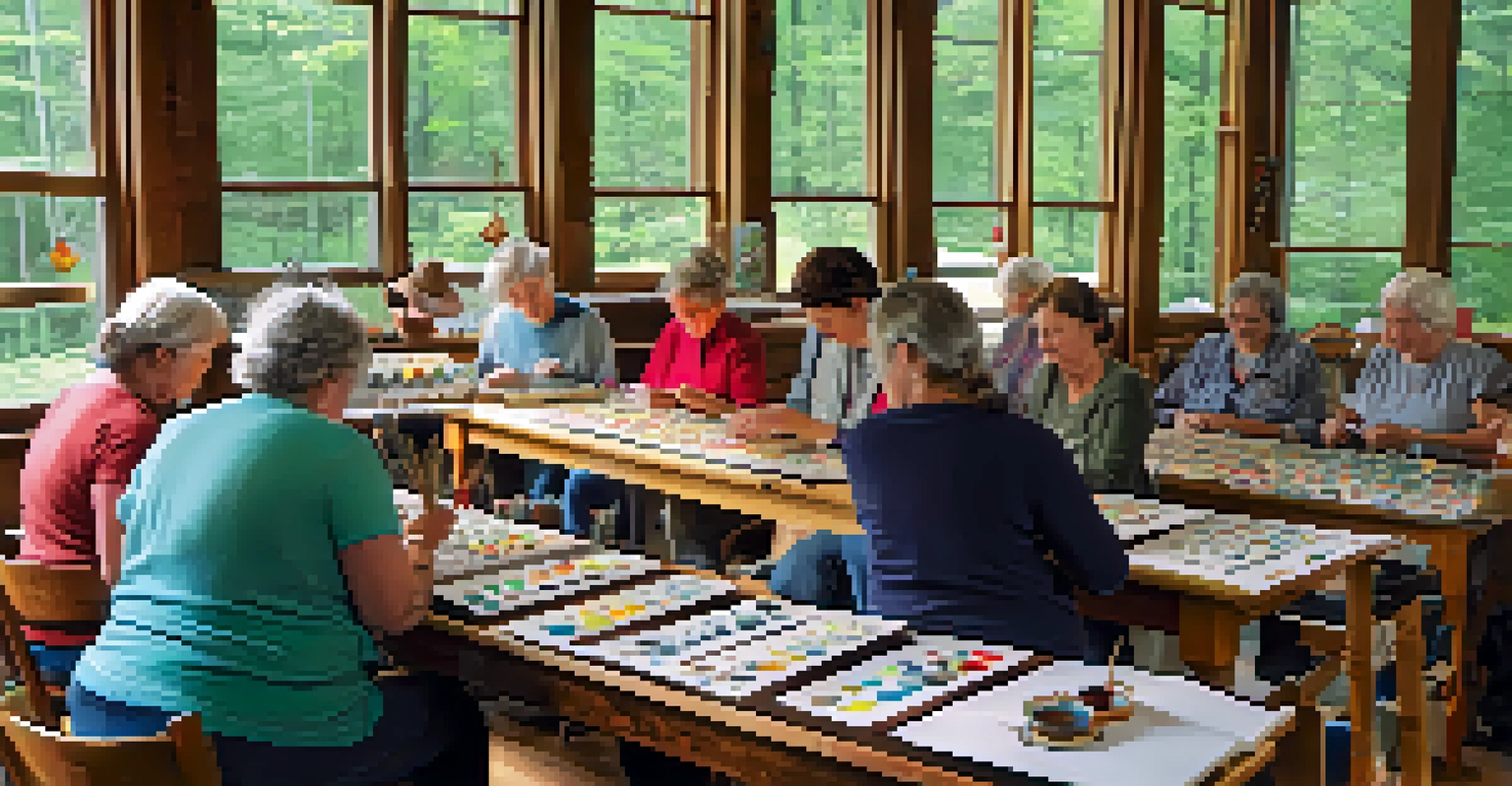Cultural Preservation: Museums and Heritage Centers in NC

The Importance of Cultural Preservation in North Carolina
Cultural preservation is vital for maintaining the unique identity of communities. In North Carolina, this preservation effort is embodied by museums and heritage centers that showcase the state's rich history. These institutions not only protect artifacts but also tell the stories that connect us to our past.
Preservation of one's own culture does not require contempt or disrespect for other cultures.
As we explore North Carolina's diverse heritage, we see how cultural preservation fosters a sense of belonging and pride among its residents. This connection helps to transmit traditions and values to future generations, ensuring that the essence of the state's culture is not lost. Museums and heritage centers serve as custodians, keeping the flame of history alive.
Moreover, cultural preservation in NC attracts visitors, enhancing local economies through tourism. When people come to engage with the past, they also discover the vibrant present of the state, blending education with enjoyment. This dynamic interplay between history and culture enriches both locals and tourists alike.
Notable Museums Celebrating North Carolina's History
North Carolina is home to numerous museums that play a pivotal role in cultural preservation. For instance, the North Carolina Museum of History in Raleigh offers exhibits that span centuries, highlighting significant events and figures that shaped the state. From Native American heritage to the Civil Rights Movement, these stories are woven into the fabric of NC's identity.

Another gem is the Greensboro Science Center, which combines history with natural sciences, demonstrating the interconnectedness of our cultural and natural heritage. Interactive exhibits engage visitors of all ages and make learning about history fun and memorable. Such museums are designed not just to inform but also to inspire curiosity about our past.
Cultural Preservation Builds Identity
Cultural preservation in North Carolina strengthens community identity and pride through the stories and artifacts showcased in museums and heritage centers.
Additionally, the Museum of the Cape Fear Historical Complex in Fayetteville provides insight into the region's military history and its impact on the community. By showcasing artifacts, documents, and personal stories, this museum fosters a deeper understanding of the sacrifices made for our freedom, further enriching the cultural narrative of North Carolina.
Heritage Centers: Guardians of Local Traditions
Heritage centers across North Carolina serve as important venues for the preservation of local traditions. These centers often focus on specific communities or cultural practices, ensuring that unique customs are maintained and celebrated. By offering workshops, events, and exhibits, they create spaces where tradition thrives.
The past is never dead. It's not even past.
For example, the Mountain Heritage Center in Cullowhee highlights the Appalachian culture through crafts, music, and storytelling. Visitors can immerse themselves in the vibrant traditions that have shaped the region's identity over generations. This engagement fosters appreciation and respect for the culture while keeping it alive.
Moreover, heritage centers often collaborate with local artists and historians, creating a platform for contemporary voices alongside historical narratives. This blend of old and new not only enriches the cultural landscape but also encourages innovation within traditional practices. Such initiatives ensure that cultural preservation is a living, evolving process.
Engaging the Community in Cultural Preservation
Community involvement is crucial for successful cultural preservation efforts. Museums and heritage centers in North Carolina actively engage local residents in various initiatives, from volunteer opportunities to educational programs. This participation fosters a sense of ownership and pride in the preservation of their cultural heritage.
For instance, many institutions host workshops where community members can learn traditional crafts or cooking techniques. These hands-on experiences not only teach skills but also strengthen community bonds. When individuals share their knowledge and experiences, it creates a richer tapestry of cultural understanding.
Engagement Fuels Community Involvement
Active community participation in cultural preservation initiatives fosters a sense of ownership and enriches local heritage through shared experiences.
Furthermore, cultural events and festivals organized by these institutions often draw in crowds, celebrating the unique aspects of North Carolina's heritage. By inviting the community to join in these celebrations, museums and heritage centers become vibrant hubs of cultural exchange and understanding. This collaborative spirit is essential for the future of cultural preservation.
Digital Innovation in Cultural Preservation
In an increasingly digital world, many museums and heritage centers are embracing technology to enhance cultural preservation. Online exhibits and virtual tours allow people from all over the globe to engage with North Carolina's rich history. This accessibility broadens the reach of cultural education and encourages a wider appreciation of local heritage.
Additionally, social media platforms are being used to share stories, artifacts, and events, creating an interactive dialogue with audiences. By leveraging these tools, institutions can connect with younger generations who may prefer digital engagement. This innovative approach helps keep the conversation about cultural preservation alive.
Moreover, digital archives are being created to safeguard important documents and artifacts for future generations. These efforts not only protect valuable history but also make it easier for researchers and enthusiasts to access information. Digital innovation is transforming how we approach cultural preservation, ensuring that history is preserved in dynamic and engaging ways.
The Role of Education in Cultural Preservation
Education is a cornerstone of cultural preservation, and North Carolina's museums and heritage centers play a vital role in this regard. They offer a variety of educational programs, workshops, and field trips to schools, helping students connect with their cultural roots. By incorporating local history into the curriculum, educators foster a sense of pride in students' heritage.
Programs often include interactive exhibits and hands-on learning experiences, making the history come alive for young learners. This approach not only enhances engagement but also helps students develop critical thinking skills as they explore the complexities of their culture. A well-rounded education in cultural preservation prepares students to be informed and active participants in their communities.
Digital Tools Enhance Accessibility
Embracing digital innovation allows museums and heritage centers to reach broader audiences and make cultural education more engaging and accessible.
Furthermore, partnerships between educational institutions and cultural organizations are becoming increasingly common. These collaborations create rich learning environments where students can explore various aspects of their culture while also developing a love for history. Together, they can build a future where cultural preservation is valued and celebrated.
Looking Ahead: The Future of Cultural Preservation in NC
As we look to the future, the importance of cultural preservation in North Carolina remains clear. Museums and heritage centers will continue to adapt to changing societal needs while remaining steadfast in their mission to protect and celebrate local culture. New generations will take up the mantle, ensuring that the stories of their ancestors are not forgotten.
Innovative approaches, such as incorporating virtual reality experiences or interactive exhibits, will likely become more prevalent. These advancements can engage a wider audience and cater to diverse learning styles, making history more accessible than ever. Embracing technology while honoring tradition is key to successful preservation efforts.

Ultimately, the future of cultural preservation in North Carolina depends on the collective efforts of communities, educators, and cultural institutions. By working together, they can ensure that the vibrant tapestry of North Carolina's history continues to thrive, inspiring generations to come. The journey of preserving culture is ongoing, but with passion and commitment, the legacy will endure.